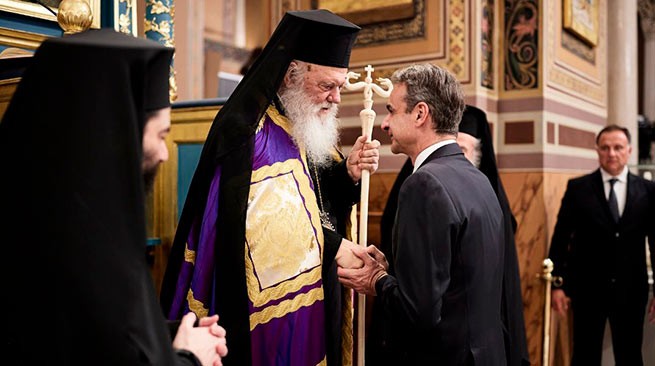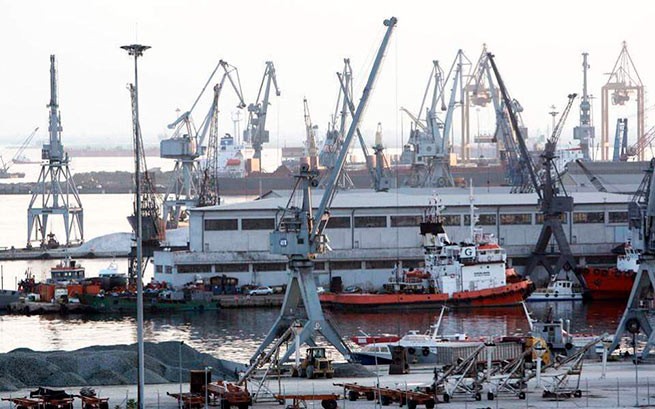When Greece bogged down in memorandums of understanding in the early 2010s and agreed to an intensive program of strategic infrastructure privatization,
such as the country’s main ports of international interest, only far-sighted analysts in the US and Europe could have guessed that a few years later the question would arise about trust in Turkey as a NATO ally, or that Russia and Ukraine will be involved in a bloody war. The rivalry between the United States and China was not so distinct then, and certainly did not take on the scale that it has today.
In European capitals, the priority at the time was to manage the debt crisis and secure the repayment of Greece’s loans. This is how the privatization of the Piraeus Port Authority and then the Thessaloniki Port Authority began. Piraeus was fought over by the Chinese company Cosco, which, as we know, eventually won, and the Danish shipping company AP Møller – Mærsk, which did not even submit an application, since the Chinese in previous years managed to take two berths in Piraeus into sub-concession, which complicated the Danish business -plan.
The first loud voices against giving the concession to the Chinese group came from the rival ports of Northern Europe, which, as it turned out, were worried about the rapid growth of Piraeus and rightly feared to give up their share to the European South, in particular to Greece. And in the US, many were skeptical about this Chinese penetration. But few could do anything about it, because in a free economy it is, to put it mildly, difficult, if not impossible, to convince a private company to invest where it is not interested. After all, this is one of the main reasons why, at the end of 2019, the United States finally began to create a state-owned development bank – the US International Development Finance Corporation, known in Greece as DFC.
In essence, this is a financial division that, under strict financial conditions, provides guarantees to companies that are believed to serve the interests of the United States. That is why the DFC recently approved support for a financing scheme for the development of shipyards in Elefsina. A sector also of interest to NATO military forces, which may want to have more maintenance and repair capacity in the area.
Shortly after Cosco acquired a majority stake in the Port of Piraeus in 2016, the Port of Thessaloniki was sold in 2018. In this case, a large French shipping company (CMA) and a German investment fund (DIEP), in a joint venture with Greek-born and former Russian Duma deputy businessman Ivan Savvidis, were competing for the second largest port in Greece, which is also a key port gateway to the Balkans.
Meanwhile, the US confrontation with China continued to escalate, and the European Union began imposing restrictions on the acquisition of strategic infrastructure by Chinese companies, such as, but not limited to, energy. Shortly thereafter, the Germans involved in the PPA joint venture decided to sell their stake to the Savvidis group, which thus acquired a majority stake.
Thus, despite the fact that the public sector continues to own a stake in both concessionaires, in the eyes of the West, two large Greek ports (ΟΛΠ και ΟΛΘ) – although the operational structure of the ports is closely controlled by the Greek state – are viewed with skepticism from a geopolitical point of view. This is despite their many international trade partnerships, significant commercial and economic activity, and development. Moreover, tensions between Russia and Ukraine have escalated throughout the preceding period, beginning in 2014 and the annexation of Crimea, while Ankara continued to advance its own geopolitical aspirations, to the frequent dismay of its NATO allies. First, with regard to Syria and Kurdistan, and then with its cunning (both yours and ours) position in the Russian-Ukrainian war. The need for a large port foothold of direct influence for the Greek government, a close and reliable ally of the United States and EUhas become imperative.
In addition, American interest in Greek ports had already been clearly expressed by this time, including by the then US Ambassador to Greece, Geoffrey Pyatt. And of course, the current US Ambassador George Tsunis, in his speeches already during the Senate hearings on his candidacy, clearly stated that the United States should not have allowed the Chinese group to gain control of such an important port as Piraeus. Since Piraeus and Thessaloniki had already privatized the ports, all attention turned to Alexandroupolis and Volos.
Until 2019, Greece, under the pressure of its memorandums and the financial crisis itself, was obliged to hold tenders and, respecting domestic and international law, hand over most of the ports to the highest bidder. However, having freed itself from the memorandums after 2019, Athens “froze” the tender in Alexandroupoli when they saw that their role in the war in Ukraine and on the new geopolitical and energy map of Eastern Europe had become leading.
Volos is now on the geopolitical chessboard of Greek ports. And its position next to key road, rail and energy axes and sea lanes makes it far more important than a first glance at its importance would suggest.
Therefore, it is not surprising that the American side is present in the tender with a serious prospect of DFC financial support in one of the four investment schemes participating in the final stage.







More Stories
Shock: Drag queen will carry the Olympic flame in Paris
What influenced Greece’s decision to help Kyiv with weapons?
The Minister of Health called the protesters "insignificant people, kafirs"